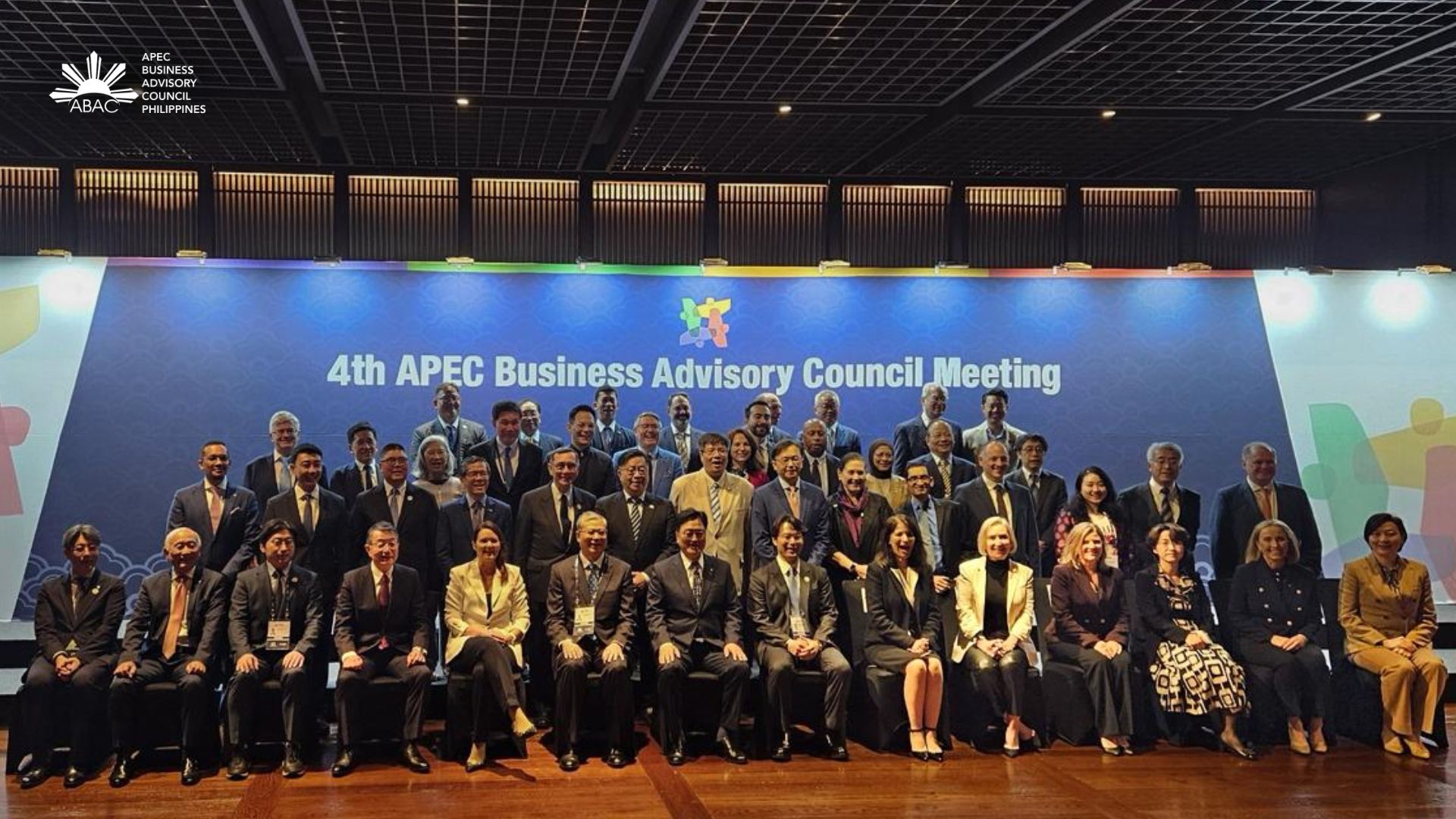
ABAC Pushes Concrete Policy Actions for Regional Integration and Shared Growth
October 29, 2025, Busan, Republic of Korea – The APEC Business Advisory Council (ABAC) wrapped up its final meeting for the year as it prepares to engage APEC Leaders in a forward-looking dialogue to present its recommendations to tackle the Asia-Pacific region’s most pressing challenges.
This ABAC Dialogue with APEC Leaders marks the culmination of a year-long process of consultation and collaboration across ABAC’s five Working Groups — Regional Integration, Sustainability, AI & Digital Innovation, Finance & Economics, and Bio & Healthcare — each focused on shaping solutions for a more resilient, inclusive, and dynamic regional economy.
“ABAC’s mission has always been to ensure that business remains a trusted partner in building a stronger and more integrated Asia-Pacific community,” said 2025 ABAC Chair Kyuho Lee (Korea). “As we confront unprecedented uncertainty and fragmentation, we must bridge divides, empower businesses, and move beyond recovery toward long-term prosperity.”
Key Actions and Recommendations
Throughout 2025, ABAC’s Working Groups have developed 41 concrete recommendations for APEC Leaders, representing the collective voice of business from across the region. These outline a unified roadmap for inclusive and sustainable growth:
- Regional Integration: Rebuild confidence in the multilateral trading system; accelerate the realization of the Free Trade Area of the Asia-Pacific (FTAAP); enable seamless digital trade with early deliverables, like the APEC Centre of Excellence on Paperless Trade; and enhance regional connectivity through resilient infrastructure.
- Sustainability: Advance realistic and inclusive energy transitions; harmonize sustainability standards; and promote circular, low-carbon supply chains.
- AI & Digital Innovation: Lead in Digital Transformation by ensuring equitable access to secure, sustainable digital infrastructure; shaping responsible AI deployment and governance; and developing interoperable digital trade rules.
- Finance & Economics: Mobilize financing to close the USD 2.5 trillion annual investment gap to fund energy transitions, digital infrastructure, and disaster response; ensure policy predictability; and support a forward-looking Finance Ministers’ Process Roadmap.
- Bio & Healthcare: Expand equitable access to healthcare; leverage genomics and AI; enhance resilience to brain health challenges; and tackle demographic shifts by promoting workforce participation, labor mobility, skills recognition, pensions reform, and emerging technologies.
These recommendations chart a comprehensive plan for an integrated, sustainable, and inclusive Asia-Pacific economy — one that bridges divides, empowers businesses, and looks beyond immediate recovery to secure long-term prosperity for the region.
ABAC Philippines Highlights Disaster Resilience for Sustainable Development in the Asia-Pacific
Under the Sustainability Working Group (SWG), ABAC Philippines warned APEC economies on intensifying natural disasters as a cross-cutting threat that curtails developments in regional stability, sustainability, digitalization, economic and financial inclusion, and healthcare, among others.
The advocacy led ABAC Philippines to organize a forum, “From Risk to Readiness: Sharing Best Practices in Disaster Resilience,” that brought together public and private disaster resilience leaders, experts, and stakeholders across the globe. The forum served as a platform to discuss and share experiences, expertise, and practices between the best-prepared and high-risk economies. At the end of the discussion, disaster resilience practitioners advanced recommendations to APEC Leaders:
- Leverage participative governance structures,
- Promote cohesive cross-border and cross-sector disaster management strategies, and
- Deploy emerging risk-mitigating technologies to coordinate and accelerate disaster risk reduction efforts.
These recommendations were featured in Mr. Luz’s column, “From risk to readiness,” and detailed in the culminating Forum Report.
“We must bounce back from natural disasters better than how we were before it. The ultimate resilience dividend is when disaster preparedness benefits our communities, even if a disaster does not strike,” said Guillermo M. Luz, Alternate Member of ABAC Philippines, to conclude the forum, highlighting the urgent work to constantly prepare and build resilience in our economies, businesses, and communities for the enduring prosperity of APEC.
Collaboration for Shared Prosperity
At the heart of this year’s ABAC is the theme “Bridge. Business. Beyond.” ABAC remains open to collaborate with governments and like-minded institutions to fulfill our shared responsibility and secure stability and opportunity for all.
The Honorable Woo Won-Shik, Speaker of Korea’s National Assembly, welcomed participants to the meeting.
Incoming ABAC Chair 2026, Li Fanrong (China) briefed the ABAC Members on the proposed Work Program for ABAC 2026.
____________________________________________________________
APEC Member Economies: Australia; Brunei Darussalam; Canada; Chile; China; Hong Kong, China; Indonesia; Japan; Korea; Malaysia; Mexico; New Zealand; Papua New Guinea; Peru; Philippines; Russia; Singapore; Chinese Taipei; Thailand; United States of America; and Viet Nam.
ABAC was created by APEC Leaders in 1995 to be the primary voice of business in APEC. Each economy has three members who are appointed by their respective Leaders. They meet four times a year in preparation for the presentation of their recommendations to the Leaders in a dialogue that is a key event in the annual APEC Economic Leaders Meeting.
Under Korea’s leadership, ABAC is pursuing a work program under the theme “Bridge. Business. Beyond.” to respond to the challenge of maintaining the economic vitality of the Asia-Pacific Region and ensure it benefits all.
ABAC 2025 Chair is Kyuho Lee (Korea) and the Co-Chairs are Julia Torreblanca (Peru) and Fanrong Li (China), with five (5) working group chairs, namely: Anna Curzon (New Zealand), Regional Economic Integration Working Group (REIWG); Junichiro Ikeda (Japan), Sustainability Working Group (SWG); Michaela Browning (Australia), Finance and Economic Working Group (FEWG); Jan De Silva (Canada), AI and Digital Innovation Working Group (AIDIWG); and Kyuho Lee (Korea), Bio and Healthcare Working Group (BHWG).
For further information, please contact ABAC Secretariat at secretariat@abac.ph via email.